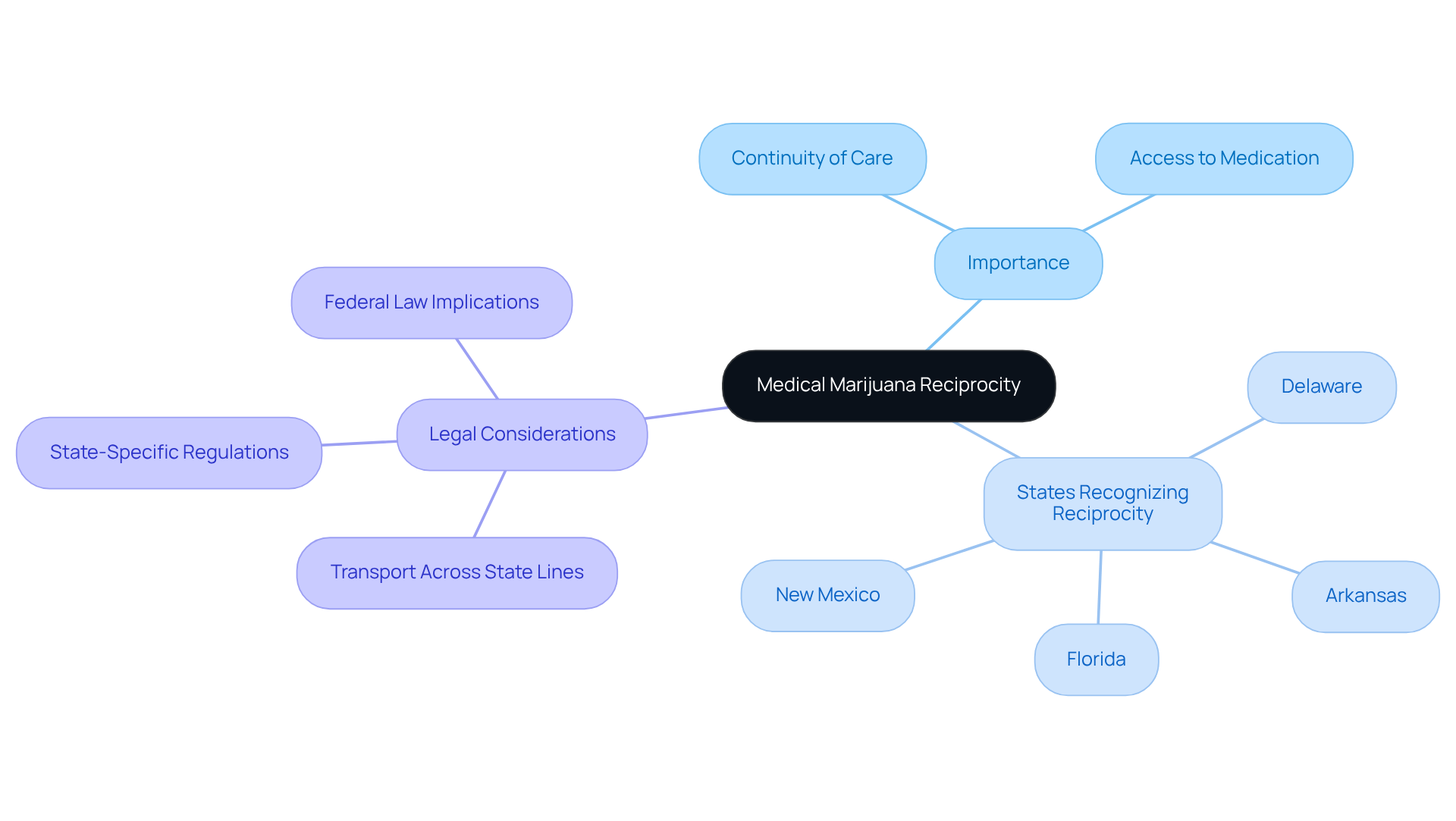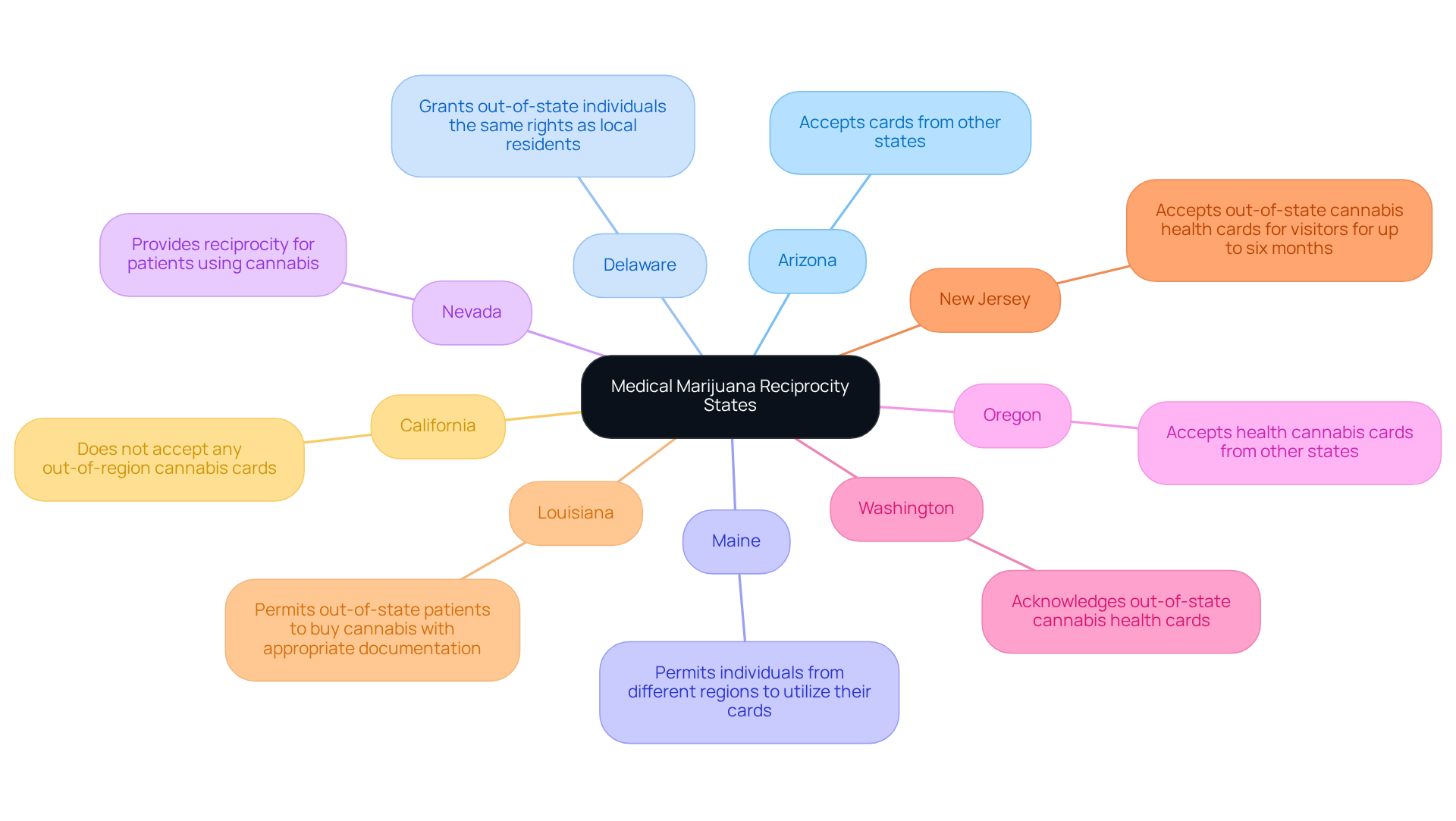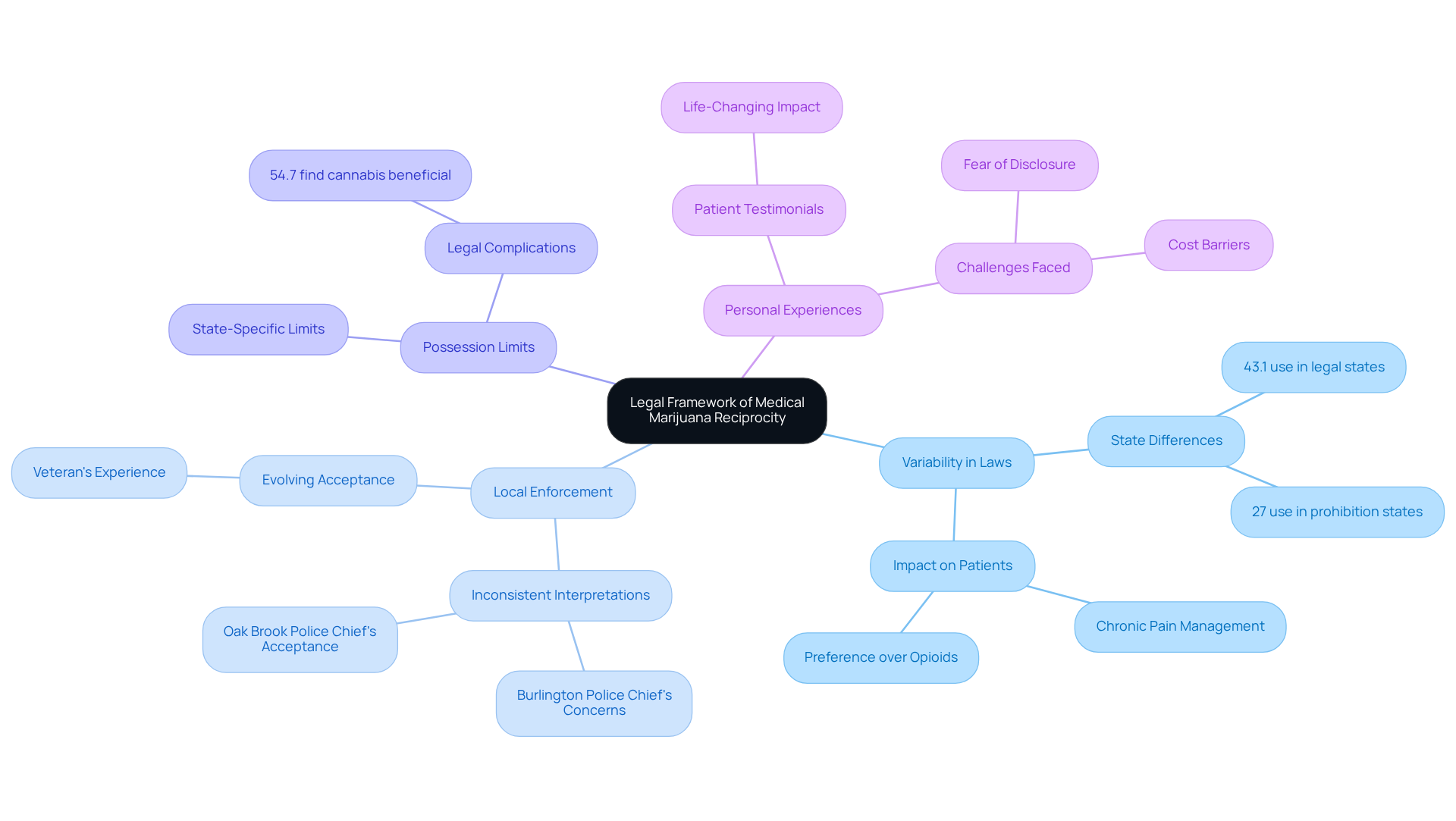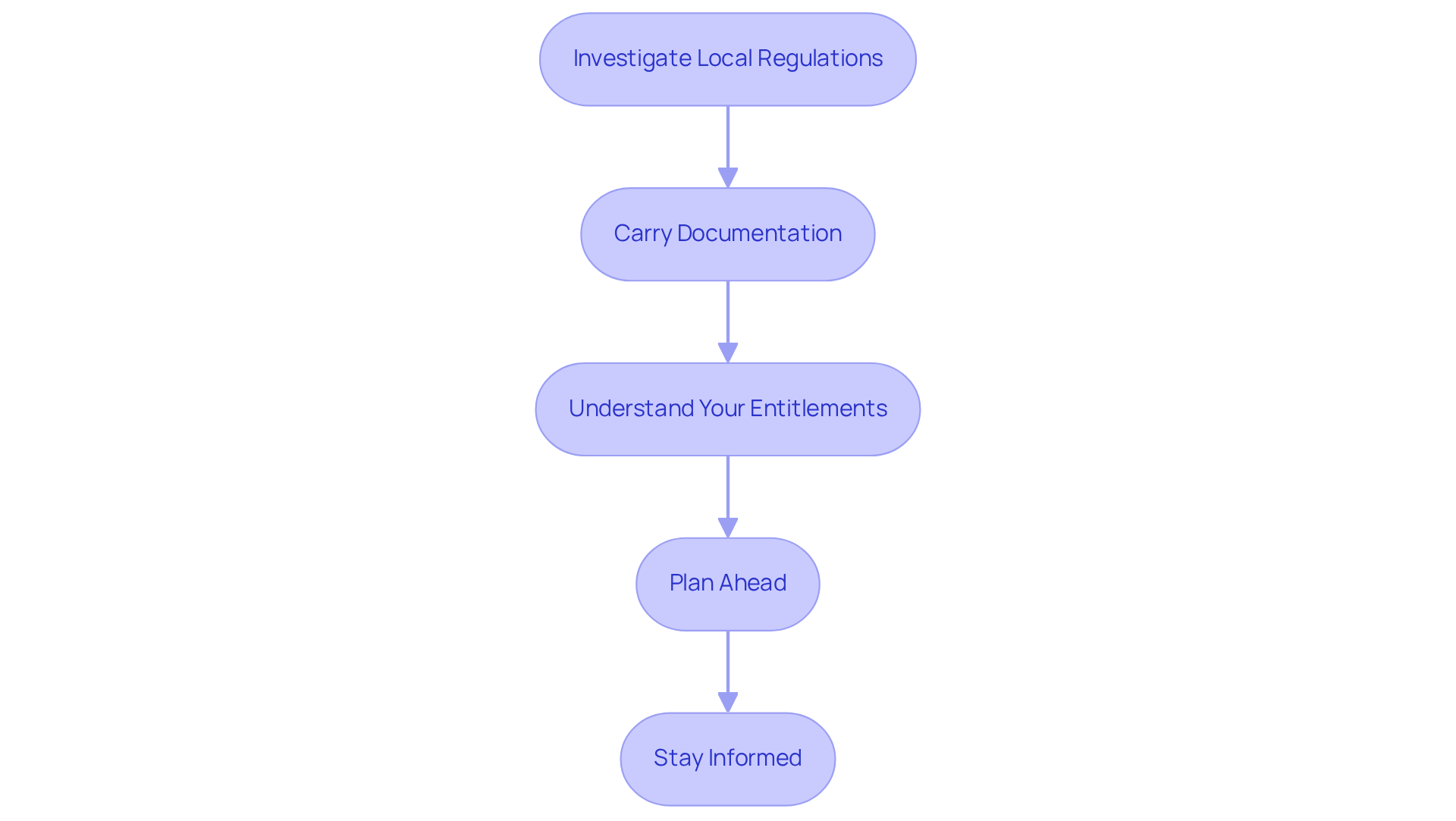Navigating Medical Marijuana Reciprocity States for Patients
by Maya Green · September 11, 2025
Discover key insights on medical marijuana reciprocity states for patient access and legal navigation.

Overview
Navigating medical marijuana reciprocity states is essential for patients holding medical marijuana cards from one state who wish to access cannabis in another state that recognizes their card. It’s important to remember that understanding local regulations is crucial.
By carrying the necessary documentation and staying informed about the evolving legal landscape, you can ensure that accessing your medication comes without legal complications. You may find that being proactive in these areas not only alleviates stress but also empowers you to focus on your health and well-being.
Introduction
Navigating the intricate landscape of medical marijuana laws can feel overwhelming for many patients. It’s important to acknowledge the challenges you may face, especially when trying to understand reciprocity between states. Medical marijuana reciprocity allows individuals to use their out-of-state medical marijuana cards in various jurisdictions, ensuring you can access essential treatments while traveling or relocating.
However, with each state having its own set of regulations, you might wonder: how can you effectively navigate these often confusing laws to receive the care you need without legal repercussions? This article explores the significance of medical marijuana reciprocity, highlights the states that recognize it, and offers essential tips for you to travel confidently and legally with your medication.
Define Medical Marijuana Reciprocity and Its Importance
Medical marijuana reciprocity states provide vital legal recognition that allows medical marijuana cards issued by one state to be acknowledged in another. This aspect is particularly important for individuals who travel or relocate between states with varying cannabis regulations. It offers peace of mind, enabling individuals to access their medication without fear of legal consequences, thus ensuring a continuity of care that many depend on.
For those living with chronic pain, this means maintaining their treatment routine while away from home, which is essential for effective management of their conditions. At Leafy DOC, we are dedicated to empowering individuals by providing telehealth solutions that connect them with state-licensed physicians. These professionals can offer personalized assessments and guidance on navigating the often complex regulations surrounding medical marijuana.
Recent developments highlight a growing recognition of medical marijuana reciprocity states, such as:
- Delaware
- Florida
- Arkansas
- New Mexico
These states allow out-of-area cardholders to enjoy their benefits just like local residents. However, it’s important to remember that some regions, such as Texas, do not recognize out-of-region health cannabis cards, which can create challenges for those traveling there.
Additionally, individuals should be aware of the legal restrictions regarding cannabis transport across state lines. Despite local regulations permitting its use, federal law continues to prohibit transport, underscoring the need for awareness of evolving laws that directly affect access to essential treatments. Staying informed about these changes is crucial for ensuring that you can receive the care you need, wherever you are.
Identify States with Medical Marijuana Reciprocity
Currently, many regions are recognized as medical marijuana reciprocity states, allowing individuals from various areas to utilize their cannabis cards. If you’re navigating this complex landscape, it’s comforting to know that the following states recognize out-of-state medical marijuana cards:
- Arizona: Accepts cards from other states.
- Delaware is classified as one of the medical marijuana reciprocity states, granting out-of-state individuals the same rights as local residents.
- Maine is classified among the medical marijuana reciprocity states that permit individuals from different regions to utilize their cards.
- Nevada is classified among the medical marijuana reciprocity states that provide reciprocity for patients using cannabis.
- Oregon is classified as one of the medical marijuana reciprocity states, as it accepts health cannabis cards from other states.
- Washington is classified among the medical marijuana reciprocity states that acknowledge out-of-state cannabis health cards.
- In the list of medical marijuana reciprocity states, New Jersey accepts out-of-state cannabis health cards for visitors for up to six months.
- In Louisiana, a notable example of medical marijuana reciprocity states, out-of-state patients are permitted to buy cannabis with the appropriate documentation.
It’s important to remember that California does not accept any out-of-region cannabis cards, which means visitors cannot access the region’s cannabis dispensaries.
As of mid-2025, approximately 42 regions plus Washington D.C. have cannabis programs, although not all qualify as medical marijuana reciprocity states. Some regions may require individuals to enroll with the jurisdiction after obtaining their certification from a physician, while others may not. Additionally, cannabis certification renewals can vary, typically occurring every one to three years.
You may find it helpful to verify the current status of these laws, as they can change frequently. Consulting local dispensaries or regional health departments can provide you with the most accurate and up-to-date information regarding cannabis access. This includes understanding the procedure for acquiring your health card and navigating renewal requirements. Remember, you are not alone in this journey, and there are resources available to support you.
Examine Legal Framework and Challenges of Reciprocity
Navigating the legal environment surrounding medical marijuana reciprocity states can be challenging and often overwhelming for individuals. The complexity of regulations varies significantly across regions, leading to multiple obstacles. It’s crucial to understand these issues to ensure a smoother experience for those seeking relief in medical marijuana reciprocity states.
Variability in laws regarding medical marijuana among medical marijuana reciprocity states can create confusion for patients traveling across state lines. For instance, a nationwide survey revealed that 43.1% of participants in fully legal states used cannabis for therapeutic purposes, compared to only 27% in prohibition states. This highlights the stark differences in access and legality. Many individuals, especially those suffering from chronic pain, report significant improvements in their quality of life, often choosing cannabis over opioids due to its effectiveness and lower risk of dependency. One individual shared, “Using medical cannabis has changed my life; I can finally manage my pain without the fear of addiction.”
-
Local Enforcement: Even in states that recognize reciprocity, local law enforcement may interpret the laws differently. This inconsistency can lead to uncertainty for individuals who may not be aware of local regulations. For example, Burlington Police Chief Mike Schirling initially voiced concerns about a dispensary opening but later acknowledged he was unaware of any issues once it was operational. Similarly, Oak Brook Police Chief James Kruger Jr. reported no significant problems with cannabis regulations after implementation. This evolving acceptance is crucial for individuals seeking relief through medical cannabis. A veteran noted, “It’s reassuring to see law enforcement understanding our needs; it makes accessing my medicine less stressful.”
-
Possession Limits: Each state establishes its own possession limits, which can result in legal complications if individuals are not fully informed. Some regions may allow greater possession quantities than others, and exceeding these limits can lead to serious consequences. A 2025 study found that 54.7% of participants indicated that cannabis was beneficial for their conditions, underscoring the importance of managing these complexities effectively.
To navigate these challenges, it’s vital for individuals to thoroughly research the specific laws of the medical marijuana reciprocity states they intend to visit. Pay close attention to possession limits and any additional requirements for utilizing medicinal cannabis cards. Understanding the transformative impact of cannabis on well-being can empower individuals to advocate for their needs in this evolving legal landscape. Remember, you’re not alone in this journey; many share similar experiences and challenges.
Guide Patients on Navigating Reciprocity Laws and Traveling with Medical Marijuana
Navigating the laws of medical marijuana reciprocity states and traveling with medical marijuana can be challenging, but with careful planning, you can do so safely. Here are some compassionate steps to consider:
-
Investigate Local Regulations: Before you embark on your journey, take the time to research the cannabis laws of your destination. Understanding medical marijuana reciprocity states is crucial, as these regions allow holders of out-of-state cannabis cards to acquire or possess cannabis. It’s essential to confirm whether your health card is recognized in the area you’re visiting, as this can significantly impact your travel experience.
-
Carry Documentation: Always have a copy of your cannabis prescription card and any relevant documents from your healthcare provider on hand. This can be invaluable in clarifying your legal status if questions arise. After receiving your certification, ensure you complete any necessary regional registration to obtain your ID card, which may be required for accessing dispensaries.
-
Understand Your Entitlements: Familiarize yourself with your rights as a cannabis patient in the areas you are visiting. It’s important to remember that crossing borders with cannabis, even for therapeutic reasons, is not legally permissible in medical marijuana reciprocity states. Knowing your rights is vital for your peace of mind.
-
Plan Ahead: Identify local dispensaries in medical marijuana reciprocity states before you travel and verify if they accept out-of-state cards. For example, Arkansas offers visitors the option to apply for a 30-day temporary cannabis card for a non-refundable fee of $50. Being aware of dispensary policies can help ensure you have access to your medication without unnecessary complications.
-
Stay Informed: Regulations can change frequently, so it’s wise to stay updated on any changes to cannabis laws in the states you plan to visit. Additionally, keep in mind that major airlines, including American Airlines, prohibit all forms of marijuana, including medical cannabis. Being aware of airline policies is essential for smooth travel.
By following these thoughtful guidelines, you can navigate your journey with confidence and ensure you are compliant with the law. Remember, transporting cannabis across state lines remains illegal under federal law, even between legal states, so careful planning is key to a stress-free experience.
Conclusion
Medical marijuana reciprocity is essential for ensuring that patients can access their necessary treatments without the worry of legal issues while traveling between states. This system recognizes medical marijuana cards issued in one state by others, providing a sense of security and continuity in care for individuals who depend on cannabis for therapeutic purposes.
In this article, we have explored the importance of understanding the various states that offer medical marijuana reciprocity. A comprehensive list has been shared, highlighting the unique challenges patients encounter as they navigate these laws. It’s important to remember the necessity of thorough research into local regulations, understanding possession limits, and staying updated on any changes in legal frameworks, as these factors can greatly influence a patient’s experience.
Navigating medical marijuana reciprocity laws is not merely about compliance; it’s about ensuring access to vital health care. As regulations evolve, it’s crucial for individuals to remain informed and prepared. By advocating for their rights and understanding the laws surrounding their access to medical cannabis, patients can empower themselves to manage their health effectively. A proactive approach not only enhances personal well-being but also contributes to a broader conversation about the significance of medical marijuana in improving the quality of life for many.
Frequently Asked Questions
What is medical marijuana reciprocity?
Medical marijuana reciprocity refers to the legal recognition that allows medical marijuana cards issued by one state to be acknowledged in another, enabling individuals to access their medication without legal consequences.
Why is medical marijuana reciprocity important?
It is important because it provides peace of mind for individuals who travel or relocate between states with different cannabis regulations, ensuring continuity of care for those who rely on medical marijuana for treatment.
Which states currently recognize medical marijuana reciprocity?
States that recognize medical marijuana reciprocity include Delaware, Florida, Arkansas, and New Mexico, allowing out-of-area cardholders to access their benefits similarly to local residents.
Are there states that do not recognize out-of-state medical marijuana cards?
Yes, some states, such as Texas, do not recognize out-of-region medical marijuana cards, which can create challenges for travelers.
What should individuals know about transporting cannabis across state lines?
Individuals should be aware that, despite local regulations allowing cannabis use, federal law prohibits transport across state lines, highlighting the need to stay informed about evolving laws that affect access to treatments.
How can individuals navigate the regulations surrounding medical marijuana?
Individuals can connect with state-licensed physicians through telehealth solutions, such as those offered by Leafy DOC, for personalized assessments and guidance on navigating the complex regulations of medical marijuana.
Last Updated: September 10, 2025
Get Approved for Your Medical Marijuana Card in Minutes!

Get Your Medical Card
Connect with a licensed physician online in minutes

Like This Article?
Share with your friends
Table of Contents
Keep Reading
-
Can You Absorb THC Oil Through Skin? Understanding the Process
Explore the process and effectiveness of absorbing THC oil through the skin for localized relief.
-
9 Awesome Things To Do While High
Elevate your high with these 9 incredible activities! Experience the ultimate fun and adventure while soaring to new heights. Click now for the best things to do while high and unleash an extraordinary experience like never before!
-
Top 5 Ways to Consume Cannabis Without Smoking It
Discover the top 5 ways to consume cannabis without smoking it. Learn about alternative consumption methods for medical marijuana and how they can benefit your health.







